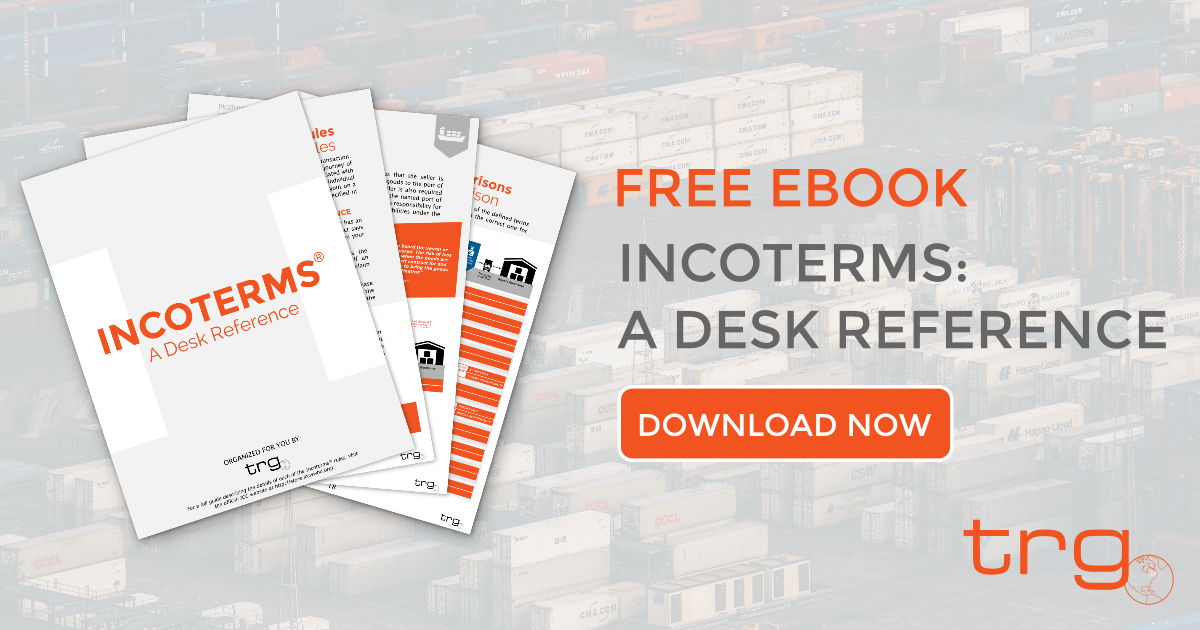Every 10 years, the International Chamber of Commerce (ICC) updates its Incoterms® rules for international trade. Here’s what’s changing for Incoterms 2020.
After months of speculation, the wait for a decade’s worth of new Incoterms® is finally over. In September, the International Chamber of Commerce (ICC) published their new set of guidelines for international trade terms used throughout the sales world.
What are Incoterms®?
Originally set in place in 1936, Incoterms® provide a baseline of terms, definitions, and rules for international trade and commerce. By adhering to a set standard, trade and business professionals can minimize misunderstandings, standardize trade processes, and clarify costs between hundreds of countries around the world.
What Incoterms® Cover – and What They Don’t
Incoterms® generally cover the practical elements of a transaction, breaking down each party’s responsibilities, time of delivery, and, most importantly, who bears the risk during each stage of the transaction.
Incoterms® guidelines also break down insurance liability, customs clearances at both import and export stages, and division of costs related to delivery, logistics, and specialized equipment needed to prepare goods for delivery.
While Incoterms® rules are designed to be all-encompassing, the involved parties may incorporate specific terms in their agreement, but additional care and caution should be taken to avoid misunderstanding.
What Incoterms® don’t cover, however, is a substitute for a contract of sale. Where as a contract would stipulate elements of an agreement such as transfer of title, pricing, payment obligations and terms, requirements for transportation, termination of contract, termination, compliance, trade restrictions, and legal obligations, Incoterms® intentionally leaves the business end of a transaction out of its guidelines.
How are Incoterms® Used in International Trade?
Incoterms® are used in the development of contracts and are shorthand references to different types of shipping, logistics, and supply. For example, a shipment that crosses an international line that has not been unloaded or cleared by customs would be designated as “DAP,” or Delivered at Place, whereas “DAT” means the goods were Delivered at Terminal with the cargo unloaded, but not cleared by customs.
There are nearly a dozen designations that quickly explain the relationship of risk and cost between the seller and the buyer, all with the goal of reducing confusion when the goods arrive and minimizing the chance of a soured relationship between parties in the future.
Why are Incoterms® Changing Now?
Every ten years, Incoterms® makes changes to their guidelines based on trends in the international trade community, shifting technologies, and feedback from business leaders. But most of all, the ICC wants to maintain its relevance to international traders and therefore adjusts its rules according to:
- Global economic growth
- Additional markets
- Changes to security standards throughout major markets
- Insurance rate and coverage adjustments based on the type of goods or transports
- Increased calls from financiers for on-board bills of lading under the FCA (Free Carrier) rule
Do Companies Have to Change their Agreements by January 1st?
Yes and no – while Incoterms® recommends any contracts entered into between now and the New Year should adhere to Incoterms® 2020, it’s more important for both parties to stipulate which set of Incoterms® guidelines applies to their agreement. If your partnership wants to continue using Incoterms® 2010 (or even 2000 standards), you’re free to do so as long as both parties are on the same page.
The most consequential change to standard forms for new contracts deal with the change between the DAT (Delivered at Terminal) designation to the new acronym DPU (Delivered at Place Unloaded). Be sure to contact all parties involved of the changes to your contract documentation.
Should arbitration or court proceedings take place, however, most officials expect to see Incoterms® 2020 for agreements made after January 1, 2020.
Do Incoterms Apply to Domestic Shipments?
Thanks to the change in the Uniform Commercial Code in 2002, which removed the “Shipment Terms, FOB, FAS, and CIF” from Part 3 of Article 2, there’s been much confusion around using Incoterms in domestic shipments. Because the use of Incoterms themselves are guidelines and not strictly enforced by law, each state determines when – and if – it will abide by the amendment passed by the National Conference of Commissioners on Uniform State Laws (NCCUSL).
Here’s a guide to the UCC codes by U.S. state.
Examining the Primary Changes in Incoterms® 2020
1. Onboard Bills of Lading in FCA
Under previous Incoterms® guidelines, parties and financiers require a bill of lading with onboard notation, but because FCA terms were technically fulfilled before goods were loaded onto a vessel, it was difficult for the seller to obtain an onboard bill of lading. Under Incoterms 2020, buyers must instruct the carrier to provide an onboard bill of lading to the seller once goods are loaded. Sellers will then issue the bill of lading to the buyer without taking on an additional obligation to the buyer within the terms of the contract.
2. Differing Insurance Levels Between CIF (Cost Insurance and Freight) and CIP (Carriage and Insurance Paid To)
Previous iterations of CIF and CIP mandated a minimum insurance coverage at a Clause (C) level of the Institute Cargo Clauses. In the new version, CIF remains at the same level of minimum insurance and allows parties to pursue higher levels of coverage, but for CIP deliveries, sellers must obtain insurance coverage at Clause (A) level, meaning the insurance level has increased to benefit the buyer. However, both parties may agree to lower levels of insurance coverage.
3. Allowing for parties to utilize their own transportation in FCA, DAP, DPU, and DDP (Delivered Duty Paid) shipments
Under 2010 rules, the assumption that a third-party carrier would be responsible for transporting goods between the buyer and seller. In the 2020 guidelines, the rules allow for transportation owned by either the buyer or seller.
4. Addition of security requirements within carriage responsibilities and associated costs
Incoterms® 2020 establishes stronger security requirements in accordance with changes made by customs officials and major international traders. These obligations will come into effect at A4 and A7 of each rule, but costs for these obligations will be featured under A9 and B9 of each rule.
5. Change in guidance language for each term
Previous iterations of Incoterms® have featured Guidance Notes at the beginning of each individual designation, but in Incoterms® 2020, they’re called Explanatory Notes for Users. Aside from the name change, these helpful tips will provide users information about when a specific designation should be used, the stages at which risk transfers from buyer to seller, and how costs are broken down at each step of the transaction. Furthermore, these notes have been revised to help users determine which rule they should use and help with interpretation of the guidance should a conflict or dispute arise during an agreement.
6. Arrangement of provisions related to costs
In Incoterms® 2020, all costs related to a sale are listed at A9/B9 under each of the specific guidelines and under each relevant article to which they pertain.By including these within both the guidelines and articles themselves, users can see a complete list in a single place and help both buyers and sellers minimize confusion.
7. Changing DAT to DPU
DAT (Delivery at Terminal) has been changed to DPU (Delivered at Place Unloaded) to provide a broader understanding of where goods have been placed. While goods could still certainly be delivered to a terminal, not every place is referred to as a terminal.
Even without incorporating them into a contract, the importance of Incoterms® to international trade has never been greater. As more markets come online, manufacturing and logistics increase throughout the world, and more complex systems take over the tracking and monitoring of shipments, having a clear and defined shorthand for international trade is crucial.






![[Webinar] Incoterms® 2020: What’s Changed?](https://traderiskguaranty.com/trgpeak/wp-content/uploads/2020/01/trg-incoterms-2020-webinar-yt.jpg)
